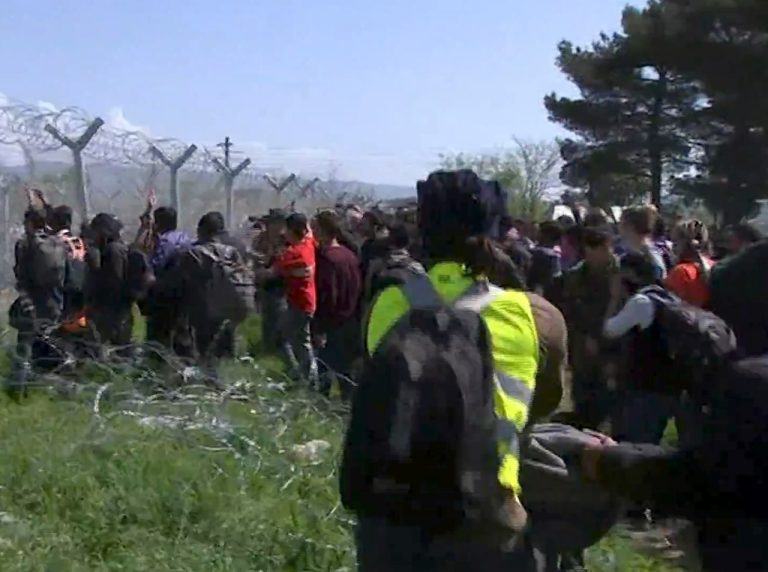
one Associated Press An Associated Press article reprinted by the political website The Hill stated that Greece is unwilling to become the recipient of refugees from the Middle East and Africa who are migrating due to climate change and other reasons. This is wrong. [emphasis, links added]
There is no evidence that long-term climate change is forcing anyone to move within the country or emigrate to foreign countries.
The story of this climate change “refugee” is one Although there is no data to support this claim, it has been circulating in the media for more than 30 years.
The article “Greek officials blame EU migration policy for failure as war and climate change fuel displacement” reads:
Walter Pusey expressed alarm at the growing number of Lebanese refugees due to continued Israeli air strikes against the militant group Hezbollah, adding: “Countries such as Somalia, Ethiopia and South Sudan…are affected by war and The impact of climate change has caused an increasingly serious refugee crisis.
Greece is the main entry point for migrants into the EU, with most crossing from Türkiye and Libya on unsafe boats.
First, let's address the obvious. In the article, although climate change is mentioned as a driver of refugees in Africa, there is no mention of how this is happening.
The AP simply mentioned it as if it were fact, without any references to back it up.
as climate realism discussed many times, There is no evidence that climate refugees exist.
For example, this article from November 2022, “No, CBS News, Somalia’s Drought Is Not Caused by Climate Change,” clearly states that Somalia, due to its location, typically experiences most droughts because the monsoons lose most of moisture when they arrive in this country.
This makes it more sensitive to changes in ocean currents than other countries. Additionally, history shows that droughts in Somalia were common as early as the 1700s.
Figure 1 Data from the past 120 years show that rainfall in the Sahel region of Africa, including Somalia, varies greatly.
The Sahel is the transition zone between the Sahara Desert in the north and the savanna of north-central Africa in the south. It includes Burkina Faso, Chad, Mali, Mauritania and Niger, as well as Cameroon, Gambia, Guinea, Nigeria, Senegal, Sudan and South Sudan.

In short, drought in the North African Sahel is a normal, recurring phenomenon that occurred long before anthropogenic climate change became a problem.
The conclusion is that other factors such as war, poverty, political conflict and lack of stable food supplies are the driving factors for refugees in Africa, rather than the imagined impacts of climate change.
Actually, One report says climate change hasn't even entered the migration equation yet, with it not expected to have any impact until mid-century, and if it does, it's only expected to be a 10% factor compared to other countries.
Population growth has also affected migration, with Africa's population having been growing steadily and expected to double by 2050 from 1.2 billion to 2.5 billion.
This puts extreme pressure on food and water supplies, with the effects more pronounced in these countries during normal drought periods.
The Associated Press article also claimed that the Middle East is the source of immigrants to Greece and blamed it on “climate change.” This is also not supported by data.
The biggest causes of migration from the Middle East are armed conflict and political instability in the regionwhich often results in people fleeing war, civil war, persecution, political corruption and human rights abuses, resulting in large numbers of refugees and displaced persons.
The Pew Research Center reports that the Middle Eastern immigrant population has more than doubled since 2005, explain,
Part of this growth is driven by individuals and families seeking economic opportunity. But much of the surge in migration, especially after 2011, is the result of armed conflict and the forced displacement of millions of people, many from their countries of birth.
All told, the immigrant population in the Middle East increased by approximately 120% between 2005 and 2015. the sum of.
The word “climate” is not mentioned once in the report.
Clearly, climate is not the driving factor behind the influx of refugees to Greece or other countries. People are fleeing conditions that affect their daily lives, rather than some imagined and non-existent threat posed by climate change.
The AP and The Hill could learn from embarrassing and telling events at the United Nations. Fabricating a climate migration crisis that never happened.
In 2005, the United Nations Environment Program (UNEP) warned that by 2010, as many as 50 million people may have become environmental refugees, fleeing the effects of climate change.
However, this never happened and the Environment Agency quietly removed the statement from their website, only to botch the attempt to disappear, adding even more embarrassment.
Now, the United Nations Environment Program and other organizations are doubling down on their failed efforts, estimating that the number of climate refugees will rise from 50 million to 1.2 billion by 2050, claims that have been widely debunked.
Sadly, The Hill chose to republish this false article without conducting any due diligence to verify these claims. It is doubly sad that the Associated Press, with its global resources, has made a false and unsourced link between the Greek migrant crisis and climate change without even doing a little research.
Some studies could easily disprove this association. This is the sad state of our journalism today.
Read more Climate Realism
